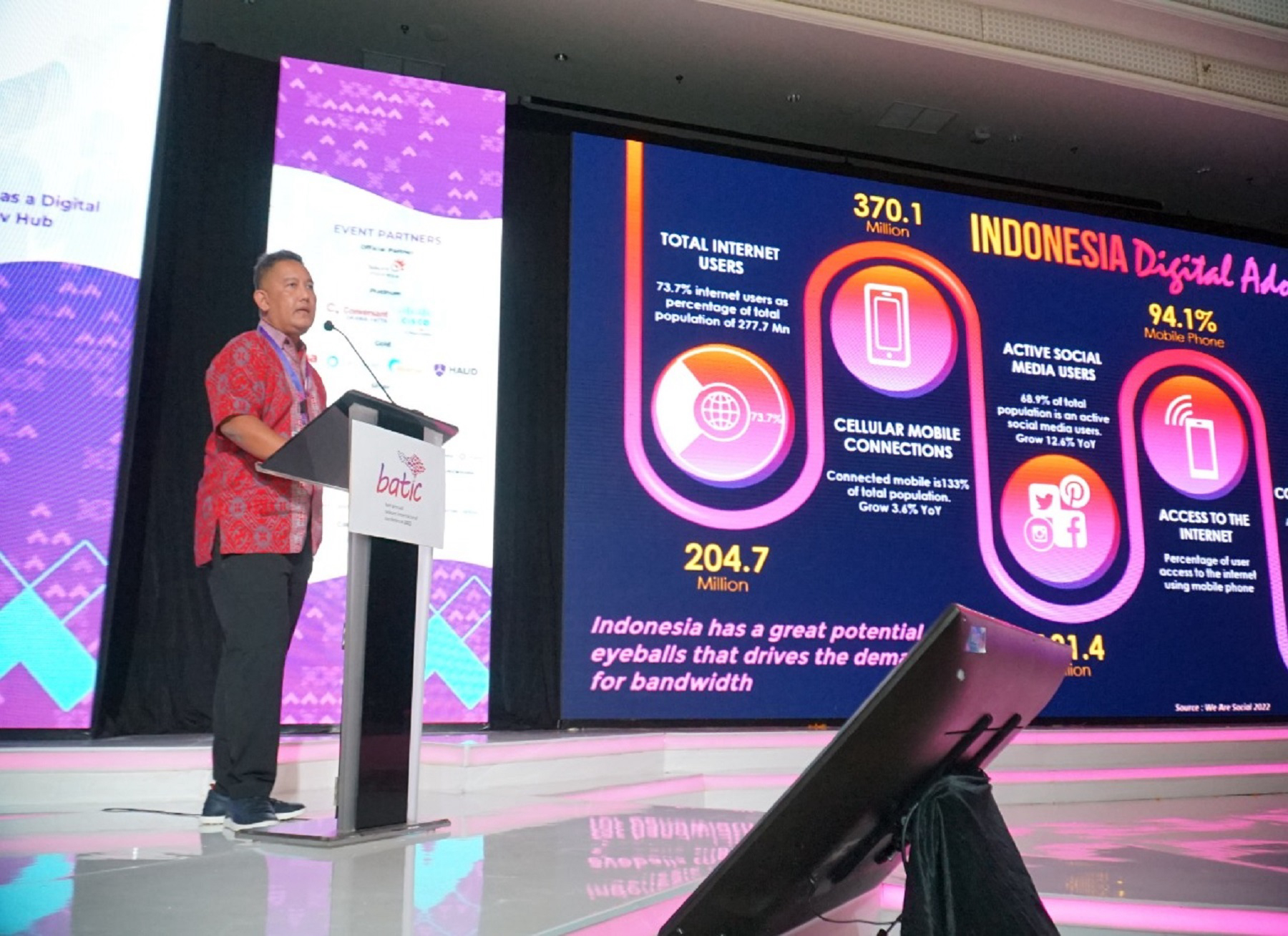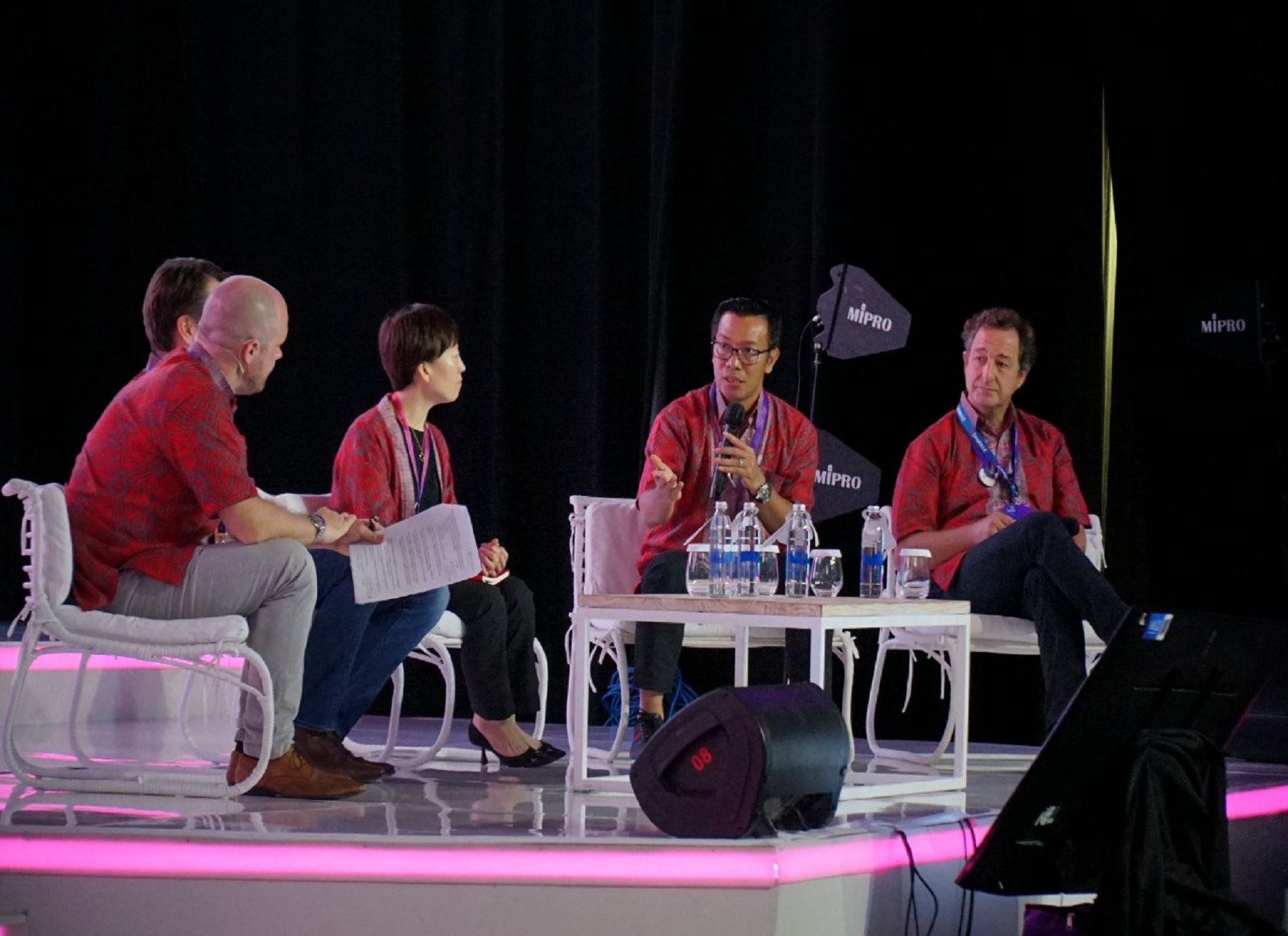
Telkom Wholesale and International Business Director Bogi Witjaksono delivered his presentation "Building the Indo-Pacific Digital Connectivity Ecosystem" at the BATIC 2022 in Nusa Dua, Bali.

Telin CEO Budi Satria Dharma Purba (second from right) were in a discussion with panelists, from TI Sparkle Leonardo Cerciello (far right), China Unicom Global Dr. Meng Shusen
Nusa Dua, 22 September 2022 – PT Tekom Indonesia (Persero) Tbk (Telkom) views that Asia Pacific connectivity has a very high growth potential, in line with the digital transformation underway in countries around the region. Telkom has implemented three strategies to capture this huge opportunity; strengthening connectivity infrastructure, building and establishing Manado the second internet gateway, and expanding data centers in the region.
Telkom Wholesale and International Business Director Bogi Witjaksono said in his presentation before 600 participants at the Bali Annual Telkom International Conference (BATIC) 2022 digital adoption in Indonesia was extraordinary. There are now about 204.7 million internet users or 73.7% of the total population, followed by 370.1 million cellular users and 191.4 million active social media users. In addition, 94.1% of internet users use mobile phones and 40.2 million users access content providers .
Bogi said TelkomGroup sees that the future trend of digital economic growth in Indonesia will be driven by content providers and hyperscale and they will need access to large international bandwidth and data centers. With this in mind, TelkomGroup has long started constructing an alternative Sea Cable Communication System network. The goal is to shift the burden of network access from the western part to the eastern part of Indonesia, in addition to mitigating should there be any network gateway disturbances in the western region.
"The large number of digital users in Indonesia will drive data traffic from content providers. Spending will continue to increase and the most important thing is how to balance user experience with investment spending," Bogi Witjaksono said at the BATIC 2022 forum, Nusa Dua, Wednesday (21/9).
Next is how to build a digital ecosystem and develop national content providers in the future. Meanwhile, to generate interest from content providers to invest in Indonesia, it requires neutrality, connectivity providers, and hyper scale data centers.
This is what the TelkomGroup has been doing, namely building seamless and low-latency connectivity, connecting the national digital ecosystem to the global, and strengthening ASEAN as a strategic hub through a submarine cable system encompassing all 20 ASEAN countries.
Bogi said Telkomis strengthening digital connectivity infrastructure so that it can become a global digital hub, by constructing 171,654 km of fiber optic backbone network, having 109 satellite transponders, 120 points of presence, 36,787 towers and 255,107 BTS units.
"By making Manado the second gateway communications network and undersea cable hub, it can connect Indonesia with global content providers, as well as improve latency and network quality performance to the United States and Hong Kong by 43%, in addition to balancing and diversifying traffic from the western and eastern regions of Indonesia," Bogi said.
In addition, the inter-gateway between Batam-Manado and the inter-POP Jakarta-Surabaya will contain seamlessly connected networks and will develop rapidly and create stable connectivity through the under-construction national capital Nusantara, which has a different route from the Manado and Batam gateways.
"With reliable infrastructure, eyeball and digital platforms, Telkom is optimistic that it can strengthen connectivity in the Indo-Pacific region and make Indonesia a new digital hub in Southeast Asia," Bogi said.
Meanwhile for the data center, TelkomGroup has established a subsidiary NeutraDC, so that it can become the leading data center business provider in Indonesia. TelkomGroup will continue to expand data centers nationally and internationally with a projection of having 400 MW capacity until 2030.
Currently, Telkom has three data centers, namely in Serpong with a capacity of 8.21 MW, Sentul with a capacity of 5.3 MW, and Surabaya with a capacity of 2.52 MW. Telkom also has a hyper scale data center in Cikarang with a capacity of 48 MW, an international data center in Singapore with 16 MW, Hong Kong 1 MW, and Timor Leste 0.5 MW. “The rapid growth of internet penetration in Asia will drive a surge in demand for data centers. "Demand for data centers in Indonesia will reach US$ 7 billion in 2026 with an 18% CAGR for the 2021-2026 period," Bogi said.
Despite its great potential, the challenge of developing the Indo-Pacific digital ecosystem requires large investments in building underwater cable networks and data centers, selecting the right partners, and determining the right locations for new data centers and environmentally friendly energy sources. "Collaboration for growth is necessary to develop a digital connectivity ecosystem in the Indo-Pacific," Bogi said.
Meanwhile, Telin CEO Budi Satria Dharma Purba as the host for BATIC 2022 was very enthusiastic in welcoming nearly 600 participants from 200 companies in various countries. "BATIC is designed as a networking facility for telco industry business people, technology owners and players in the digital business from well-known companies from around the world. This event was held as a form of Telin's contribution to the digital telecommunications industry," Budi Satria said.
Delta Partners Senior Managing Director Sam Evans appreciated the BATIC 2022 event as a very good event, since it serves as a networking forum for ICT players in the Asia Pacific region. “The 2022 BATIC Conference has been prepared to facilitate quality networking combined with Indonesian cultural nuances. A very impressive experience compared to other places," he said.
According to Sam Evans, the role of digital infrastructure in Asia Pacific will continue to increase drastically, with a focus on post-Covid 19 digital services, where socio-economic development will encourage investment in the network infrastructure sector, platforms, data centers and applications. Consumer expectations for quality content will continue to grow as devices continue to support HD and UHD and corporations migrate to the cloud. "All of this requires digital infrastructure as the foundation," Evans said.
#DigitalBisa
#UntukIndonesiaLebihBaik